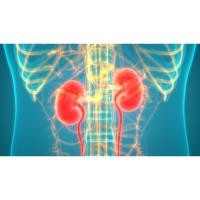Diabetic kidney disease is a condition in which kidney function declines in individuals with diabetes resulting in the inefficient removal of waste and excess fluids from the body. This can lead to a buildup of toxins and damage to other organs.
Certain factors increase the likelihood of developing diabetic kidney disease including high blood pressure, poor glucose control, genetic predisposition, and diet. Early stages of the disease may not show symptoms, but as kidney function worsens, patients may experience nausea, vomiting, loss of appetite, hiccups, and weight gain due to fluid retention. If left untreated, it can lead to heart failure and fluid accumulation in the lungs.
Various tests, such as urine protein levels, serum creatinine, and blood urea nitrogen, can diagnose kidney disease. It's crucial for individuals with diabetes to undergo regular screening.
The progression of kidney disease varies. Patients with type I diabetes typically show signs within two to five years of diagnosis. For those with type II diabetes, the timeline is less clear but symptoms tend to appear later in life.
Managing glucose levels through diet and medication can help prevent kidney disease. Additionally, controlling high blood pressure and following a low-protein diet may slow its progression. Despite these efforts, some individuals may still develop end-stage kidney failure requiring dialysis or a kidney transplant.
African Americans, Hispanic Americans, and Native Americans face a higher risk of kidney failure from type II diabetes compared to Caucasian Americans.
For those facing kidney failure, dialysis (hemodialysis or peritoneal dialysis) or a kidney transplant are treatment options. The choice depends on medical condition, lifestyle, and personal preference.
Jewish Pavilion Senior Services
-
Nancy Ludin CFO
- June 17, 2024
- (407) 678-9363
- Send Email



